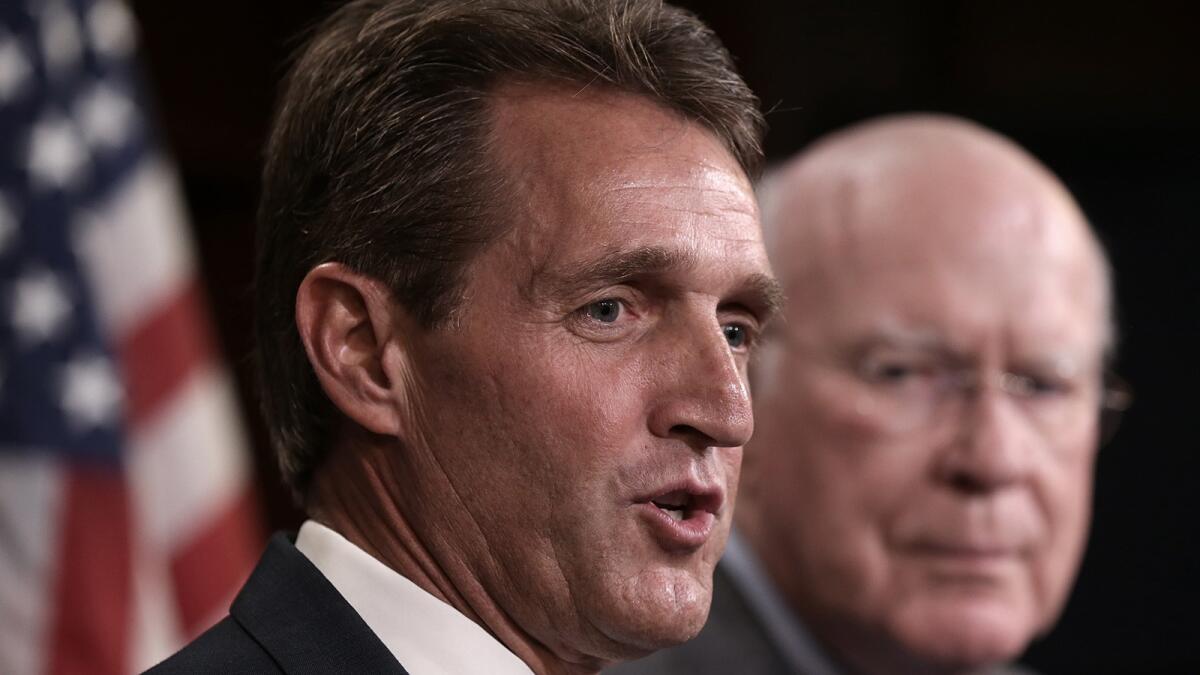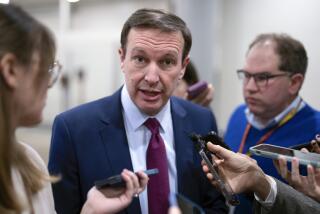Senators push legislation to lift Cuba embargo

- Share via
Reporting from Washington — Congress on Thursday began considering the first of what is expected to be a flurry of bills aimed at gradually doing away with the 54-year-old U.S. trade embargo on Cuba.
Six weeks after President Obama began easing travel restrictions as part of his historic opening to Cuba, a bipartisan group of senators introduced legislation that would do away entirely with limits on travel.
The policy “hasn’t worked, so it’s time to try something new,” Sen. Jeff Flake (R-Ariz.), a longtime reform advocate, said at a Senate news conference. “It’s time to allow Americans to travel freely to Cuba.”
The Republican leaders of both houses, as well as longtime congressional critics of the government in Havana, have vowed to fight reform legislation.
But there is wide support for an easing of the embargo in Congress, including from agricultural and commercial interests, and libertarians in the Republican party.
Many analysts predict that pro-reform lawmakers will be able to chip away at the embargo over time, even if they can’t do away with it entirely.
“I would look at this bill as the first of many to come,” said Rachel DeLevie-Orey, a Latin America specialist at the Atlantic Council, a nonpartisan think tank in Washington.
Sponsors of the legislation include Senate Budget Committee Chairman Michael B. Enzi (R-Wyo.), Minority Whip Richard J. Durbin (D-Ill.) and Sen. Patrick J. Leahy (D-Vt.).
------------
FOR THE RECORD
2:41 p.m.: An earlier version of this post left out Sen. Michael B. Enzi’s last name.
------------
Opponents of the authoritarian government in Havana have long dominated any calls to reconsider the embargo. But Obama’s diplomatic deal has made the issue a broader U.S. foreign policy concern, and opinion polls suggest that 60% of Americans support easing the embargo.
“The Cuba issue has been taken out of Florida,” home to a sizable Cuban American population, DeLevie-Orey said.
Carl Meacham, a Latin American specialist at the Center for Strategic and International Studies, a think tank in Washington, said, “If there is a critical mass among Republicans for reforming the policy, the leadership won’t be able to ignore it.”
Obama has been able to use executive orders to restore diplomatic ties, allow broader banking and business ties, and ease some limits on travel to Cuba. But a complete deregulation of U.S. tourism to Cuba would require congressional action.
Analysts said there may also be support in Congress for bills that would make it easier for U.S. firms to sell additional goods and services in Cuba.
But the Cuban government, which wants a financial boost from greater trade but fears full normalization of relations with America could erode its political control, is clearly ambivalent.
In a speech Wednesday at a regional summit, Cuban President Raul Castro said full normalization won’t be possible until the United States lifts the embargo, returns the U.S. naval facility at Guantanamo Bay, Cuba, and pays reparations.
The United States “is really chugging along quite quickly” toward normalization, DeLevie-Orey said. “On the other hand, it’s clear there’s serious tension within the Cuban regime about the end of the embargo.... They will probably tread lightly in implementing changes.”
For foreign policy news, follow me at @richtpau.
More to Read
Sign up for Essential California
The most important California stories and recommendations in your inbox every morning.
You may occasionally receive promotional content from the Los Angeles Times.













